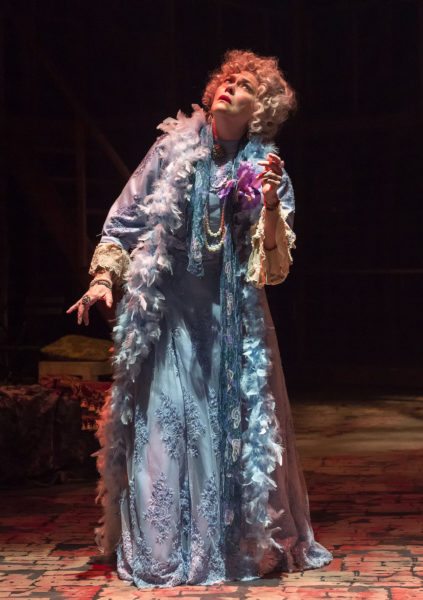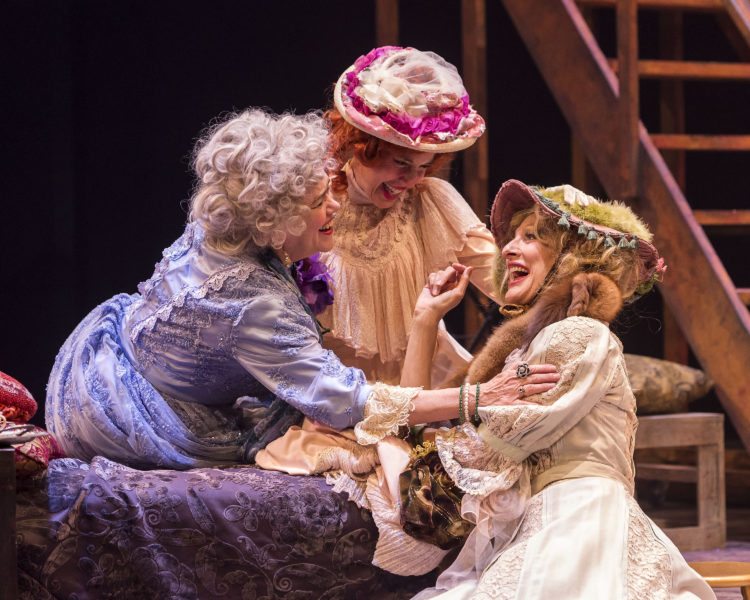
By May S. Ruiz
Playing at A Noise Within (ANW) in Pasadena from September 17 to November 11, 2017 is Jean Giraudoux’s ‘The Madwoman of Chaillot’, translated by Maurice Valency, and directed by Stephanie Shroyer.
A tale of men’s greed and the common people’s fight against it, ‘The Madwoman of Chaillot’ addresses ecological and environmental concerns – issues that affect us to this day. It is also quite significant that it has a woman as the instigator of the battle, a role usually reserved for men, when it was written at a time when having female leads in theatre was not as commonplace.
Deborah Strang, resident artist at ANW, plays the title madwoman. She says, “Clearly Giraudoux loved women; he had a fondness for the female mind and ability. There was one other play he wrote called ‘Ondine’ that I saw a while back which also featured a female protagonist. Oddly, it was also directed by Stephanie Shroyer.”
“I am very excited to be playing the ‘Madwoman of Chaillot’. First and foremost because it’s by Giraudoux, who’s an incredible French playwright and I have never done one before. So it got me particularly intrigued,” says Strang.
“Valency’s translation and adaptation recreates the spirit of the piece,” continues Strang. “It is almost Shakespearean in its rhythm and use of language, the repetition of sounds, vowels, and consonants. It’s very beautiful just to speak it – it’s poetry, almost.”
“It’s an extremely thrilling role for an actor – on every page of the script the madwoman is speaking nonstop. It’s an enormous challenge to carry almost all of the text in the play for two hours. It’s stimulating for my old brain to try to take it all in and comprehend,” Strang states self-deprecatingly.
“That it is being directed by Stephanie, whom I adore, makes it especially fun for me,” adds Strang. “This is the second time I’m working with her; the previous one I did with her was ‘You Never Can Tell’ which we had on stage a couple of years ago.
The way Stephanie puts things together is quite magical. She is a choreographer so she approaches her plays from a dancer’s mind; she directs the actors’ movements in a way that’s electrifying for the audience to watch. It’s exhilarating for actors because it’s like learning to dance; in the movement we discover new ways to explore the text.”

In ‘The Madwoman of Chaillot’, Strang co-stars with two other female resident artists whom she has known for a long time – Susan Angelo as Mme. Constance and Jill Hill as Mme. Gabrielle – and Veralyn Jones, who plays Mme. Josephine.
“Susan, Jill, and I haven’t been in the same play for some time. So it’s wonderful to work with two of my favorite actresses,” Strang says further. “The fourth madwoman, Veralyn, who is now my new best friend is someone I’ve heard of but have never worked with before. And she’s fantastic! To have four strong women on stage at the same time playing against one another is a rare treat.”
“Classical plays, in general, have more dominant male roles,” Strang points out. “And while ‘Madwoman of Chaillot’ has more men in it, they are the bad guys. Giraudoux may not have set out to create a feminist play so much as to show the underdog winning.”
Written in 1943, ‘The Madwoman of Chaillot’ follows three businessmen in Paris conspiring to destroy the city in order to unearth oil, which a prospector’s sense of smell located in the neighborhood.
However, Countess Aurelia, ‘The Madwoman of Chaillot’, hears about their plot. With an outwardly eccentric behavior but possessing a much common sense, she enlists the help of her fellow outcasts: the ragpicker, the street singer, the sewer man, the flower girl, the sergeant, and various other oddballs and dreamers. She invites them all to a tea party, reminiscent of Alice in Wonderland’s, then sends the greedy businessmen into a bottomless pit that opens out of her cellar.
“It’s a play that is extremely relevant in today’s world,” declares Strang. “When the audience hears certain lines like ‘What would you rather have in your backyard, an almond tree or an oil well?’ or ‘Why would you want a park for children?’, they all identify with the situation. This was true in Giraudoux’s time as it is now.”
“Yet in the end, the audience will have a very good time – it’s wonderful entertainment. They’re going to laugh, maybe think a bit,” Strang says. Then she adds wistfully, “Ideally it will change the world, we’ll be more generous and loving to one another.”


